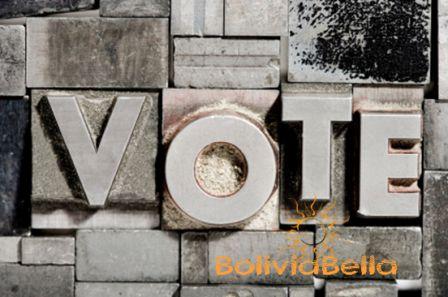|
Bolivia Facts: Voting in Bolivia Not only are voting rights guaranteed in Bolivia, but citizens are obligated to do so. All
Bolivian citizens
at least twenty-one years of age, or eighteen if married, are guaranteed the right to elect their leaders through secret ballot in free and open elections.
The electoral system is comprised of the National Electoral Court, electoral judges, electoral notaries, departmental electoral courts, and electoral juries. The most important of these bodies, the National Electoral Court, is an independent, autonomous, and impartial organization charged with conducting the electoral process. The court may recognize or deny inscription to political parties, fronts, or coalitions. Sixty days before elections, it approves a single multicolor ballot with symbols of parties or pictures of candidates running for office. The court also counts the ballots in public and investigates all charges of fraud. Once the electoral results have been certified by the National Electoral Court, it must provide credentials accrediting elected deputies and senators, as well as the president and vice president. The court must also present an annual report of its activities to Congress. The National Electoral Court consists of six members elected by Congress, the Supreme Court of Justice, the president of the republic, and the political parties with the highest number of votes in the previous election. Members serve four years and are eligible for reelection. Electoral judges are seated in the capitals of each department or province. They hear appeals by notaries regarding admission or exclusion of inscriptions in the registry, try electoral notaries and other persons for crimes committed during the electoral process, hear charges of fraud and other irregularities, and annul false electoral cards. Electoral notaries must be present at every electoral station in the country. Their principal task is to organize and provide custody for the electoral registry. They are also empowered to register citizens to vote and to keep an accurate registry of voters. The 1986 electoral law establishes ten departmental electoral courts, including one in each department capital and two in La Paz. Each court comprises six members, three of whom are named by Congress and three by the superior district courts, president of the republic, and political parties. The departmental electoral courts have the power to name all judges and notaries and to remove them if charges of corruption or inefficiency brought against them by parties are confirmed. They also are empowered to count ballots in public for the president, vice president, senators, and deputies. Each electoral jury is composed of five citizens who monitor polling stations. They are chosen randomly from the lot of citizens present at each voting table; service is compulsory. The Constitution establishes that only political parties that are duly registered with the National Electoral Court may present candidates for office. Although labor unions, entrepreneurial associations, and regional civic committees have a very large voice in policy making, by law they must work through political parties. The Constitution and the electoral law provide for a proportional representation system to ensure representation of minority parties. The proliferation of tiny parties, alliances, and electoral fronts in the late 1970s led to the enactment of Article 206 of the 1980 Electoral Law. This article states that parties, alliances, or coalitions that do not achieve 50,000 votes must repay to the national treasury the costs of printing the ballot. Repayment must be made three days after the final ballot has been counted; a jail term awaits party chiefs who fail to pay. You'll find some really interesting Bolivia political trivia here.     |
